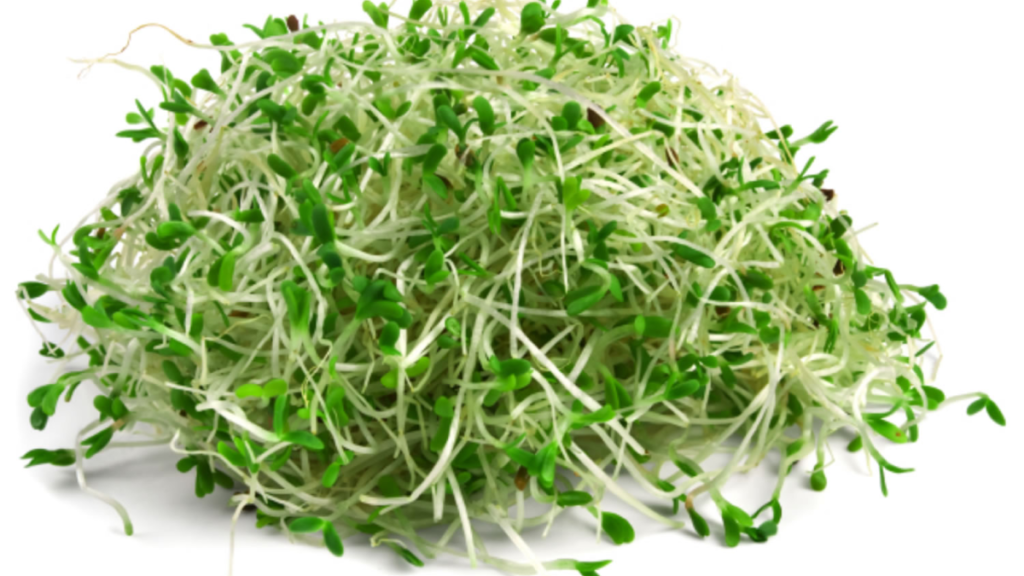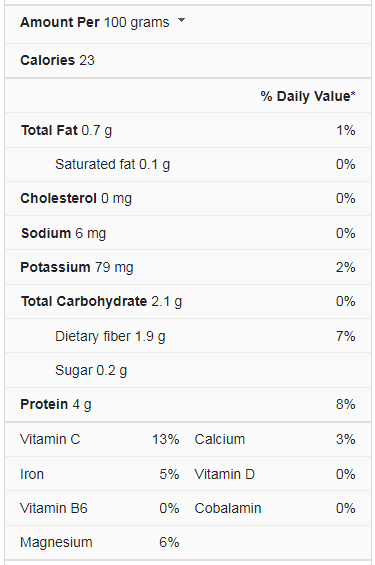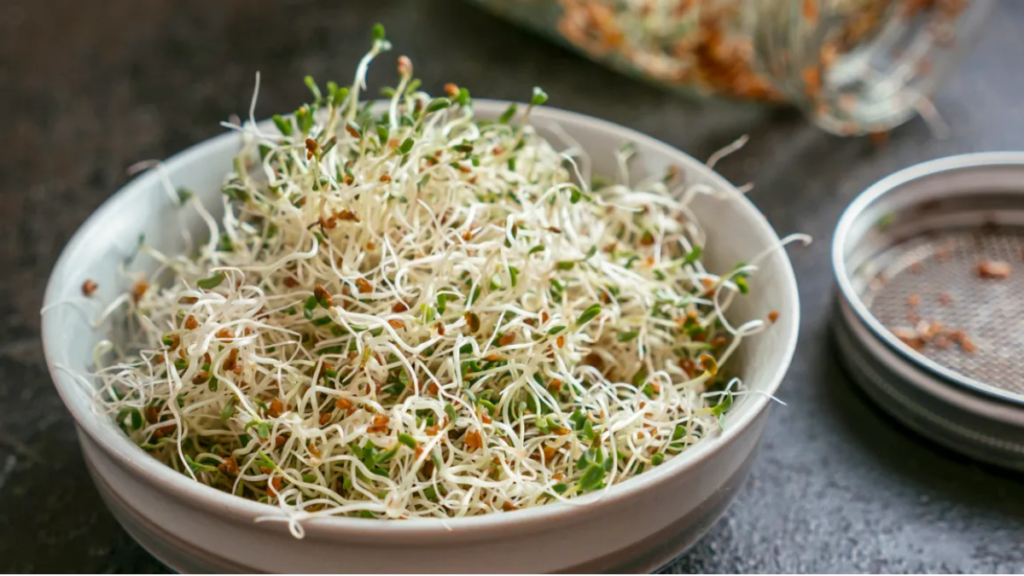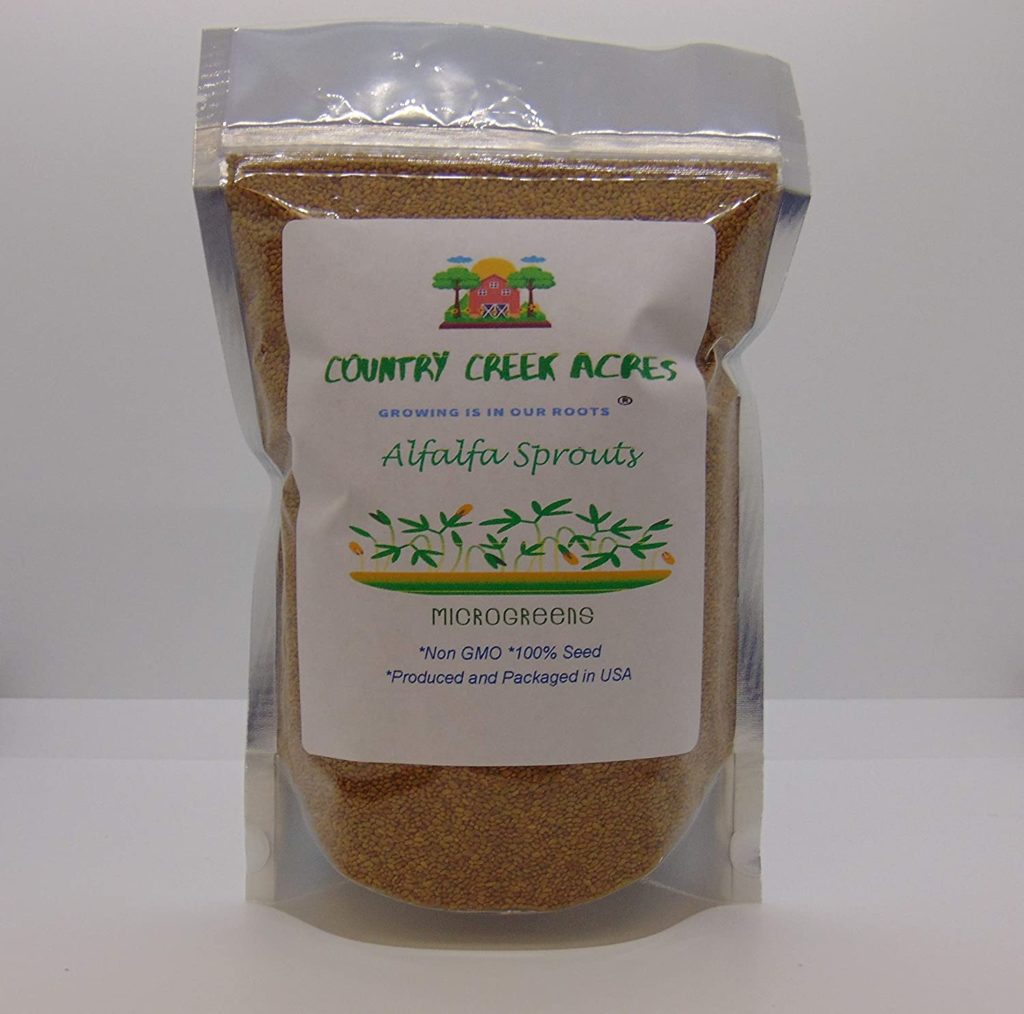Alfalfa is a plant that has been cultivated since ancient times, and it is commonly grown for livestock feed but also human consumption. Alfalfa grass nutrition facts show that it contains significant amounts of vitamin A, C, and B vitamins. It is also known as “green chop” and has been used for centuries to improve people’s health. The nutritional value of alfalfa is extensive, so it is an essential part of your diet.
The benefits of alfalfa are innumerable. Its diuretic and detoxifying properties lower blood pressure and balance hormones. It has many other benefits, including a healing effect on sore joints, bad breath, and imbalanced skin. It is a powerful immune system booster and is often included in superfood drinks and fruits. The following are some of its nutritional facts.
Alfalfa Nutrition Facts
What is Exactly Alfalfa?
Alfalfa, also known as lucerne or Medicago sativa, is a plant that has been used as animal feed for centuries. It has long been prized for its higher vitamin, mineral, and protein content than other feed sources. Alfalfa is a legume that is also classified as a herb.
It appears to have originated in South and Central Asia, but it has been grown for centuries worldwide. It has a long history of being used as a human medicinal herb and being used as feed. Its seeds or dried leaves can be supplemented, or the seeds can be sprouted and eaten as alfalfa sprouts.
Alfalfa is most commonly consumed as a herbal supplement or as alfalfa sprouts. There is no standard nutrition information because the leaves or seeds are sold as herbal supplements rather than foods. They are, however, a good source of vitamin K and contain a variety of other nutrients, such as vitamin C, copper, manganese, and folate.
What are the Health Benefits of Alfalfa?
Here are the health benefits of alfalfa:
Effective Blood Clotting
Vitamin K is an essential vitamin for blood clotting, and a single serving of alfalfa provides 13 percent of your recommended daily allowance. Vitamin K, along with chlorophyll and iron, helps people with anemia by promoting blood production. If you take the blood thinner Coumadin, you should limit your vitamin K intake because it can reduce the drug’s effectiveness.
Lower Risk of Certain Diseases
Free radicals in the body cause oxidative stress and cell damage, which raises your risk of heart disease, diabetes, cancer, Alzheimer’s disease, and other diseases. Alfalfa’s antioxidants fight free radicals and assist your body in fighting diseases.
Steady Blood Sugar
Alfalfa is a fiber-rich food that may aid in blood sugar control by slowing glucose absorption in the intestines. As a result, it could aid in managing diabetes and prediabetes.
Lower Cholesterol
Saponins are plant compounds that reduce cholesterol absorption in the intestines. Lowering your LDL cholesterol (the “bad” kind) can help you avoid heart disease, diabetes, and stroke.
Healthy Urinary Tract
Alfalfa promotes urine flow as a natural diuretic, which can aid in the removal of harmful bacteria. While it hasn’t been proven to treat an active urinary tract infection, it may help prevent one from developing.
What are the Side Effects of Alfalfa?
Alfalfa sprouts are usually safe and nutritious but may cause side effects in some people. These side effects may be expected or severe.
Common Side Effects
Due to its high fiber content, consuming raw alfalfa can cause gastrointestinal issues, including:
- Gas
- Abdominal discomfort
- Diarrhea
A more extraordinary (and more common) concern is the contamination of alfalfa sprouts by bacterial pathogens such as salmonella or E. coli.
Symptoms of Salmonella and E. coli infection include:
- Diarrhea
- Fever
- Abdominal cramps
Severe Side Effects
People with hormone-sensitive cancers such as breast, prostate, cervical, or uterine cancers should avoid alfalfa because of its estrogenic effects. Those who are pregnant or breastfeeding should avoid alfalfa for the same reasons.
Alfalfa sprouts also contain L-canavanine, an amino acid that can cause inflammation in people with autoimmune diseases such as lupus. As a result, taking alfalfa as a supplement or eating it can cause acute lupus symptoms. Before eating alfalfa sprouts or taking alfalfa supplements, talk to your doctor if you have an autoimmune disease like multiple sclerosis or rheumatoid arthritis.
What Happens if I Take too Much Alfalfa?
Never exceed the recommended dose when taking an alfalfa supplement in any form. Furthermore, alfalfa supplements are only meant to be used for a short time. Unfortunately, little is known about alfalfa supplements’ long-term safety. In people with standard immune systems, fresh alfalfa sprouts are generally considered safe. Even so, any store-bought sprouts carry the risk of bacterial contamination. Please consult a healthcare provider before beginning any supplement, including alfalfa, to ensure that it is safe for you and to determine an appropriate dose.
How do you Grow Alfalfa Sprouts?
You’ll need alfalfa seeds and a sprouting jar with a perforated lid to grow fresh alfalfa (available for purchase online and in many gardening centers).
- Add two tablespoons of alfalfa seeds to the jar.
- Cover with 1/2 cup of water and let soak overnight.
- Drain the seeds through the mesh lid and rinse thoroughly. Repeat.
- After eight hours, rinse and drain again. Store away from sunlight.
- Drain and rinse two to three times daily. Tiny sprouts will appear after around three days.
- Once the sprout tails develop, move the jar to indirect sunlight to help them turn green.
- They are ready to harvest and eat when the sprouts are 3 inches tall.
How to Add Alfalfa to your Diet?
You can take alfalfa supplements in powdered or tablet form or make tea with them. It’s difficult to recommend a safe or effective dose because there have been so few human studies on alfalfa seeds, leaves, or extract. Because the FDA does not strictly regulate herbal supplements, do your homework and purchase from a reputable manufacturer — preferably one that conducts independent third-party testing on its products. Sprouting alfalfa is another way to incorporate it into your diet. Alfalfa sprouts can be added to your diet in various ways, including sandwiches and salads.
You can buy them at health food stores or sprout them at home. Here’s how:
- Add two tablespoons of alfalfa seeds to a bowl, jar, or sprouted, and cover them with 2–3 times the amount of cool water.
- Let them soak overnight or for 8–12 hours.
- Drain and rinse the sprouts well with cool water. Drain them again, removing as much water as possible.
- Store the sprouts out of direct sunlight and at room temperature for three days. Rinse and drain them thoroughly every 8–12 hours.
- On day 4, relocate the sprouts to an area with indirect sunlight to allow photosynthesis. Continue to rinse and drain them well every 8–12 hours.
- On day 5 or 6, your sprouts are ready to eat.
Features:
- NON GMO, Alfalfa Seeds
- High Germination Rate
- Perfect for Growing Alfalfa Sprouts, Microgreens, Food Storage & more
- Grown and Packaged in the USA
- Accept Country Creek Brand Only, No Substitutions
Conclusion
The nutritional benefits of alfalfa are numerous. It contains all of the B vitamins and biotin, calcium, iron, and folate. It has a long history of medicinal use, with roots in Central and South Asia. It can be sprouted for fresh alfalfa sprouts and is commonly used for animal feed. It is also safe for women who are pregnant or nursing.
Alfalfa sprouts are the most common form of alfalfa consumption. They can be grown in any climate and provide nutrients comparable to meat. Sprouts are readily available in most supermarkets. Alternatively, alfalfa seeds can be sprouted at home. Soak two tablespoons of alfalfa seed in water for 8-12 hours to sprout the seeds. Drain the seeds and place them in indirect light after this time. In five to six days, the sprouts should be ready.
Alfalfa is high in vitamins and minerals and other nutrients. 5 percent vitamin C and 13 percent vitamin K are found in a cup of alfalfa. In addition, one cup of sprouted alfalfa grass contains eight calories, one gram of protein, and a trace of fiber. Alfalfa grass contains nutrients that are good for your heart and have been shown to help lower cholesterol levels.





